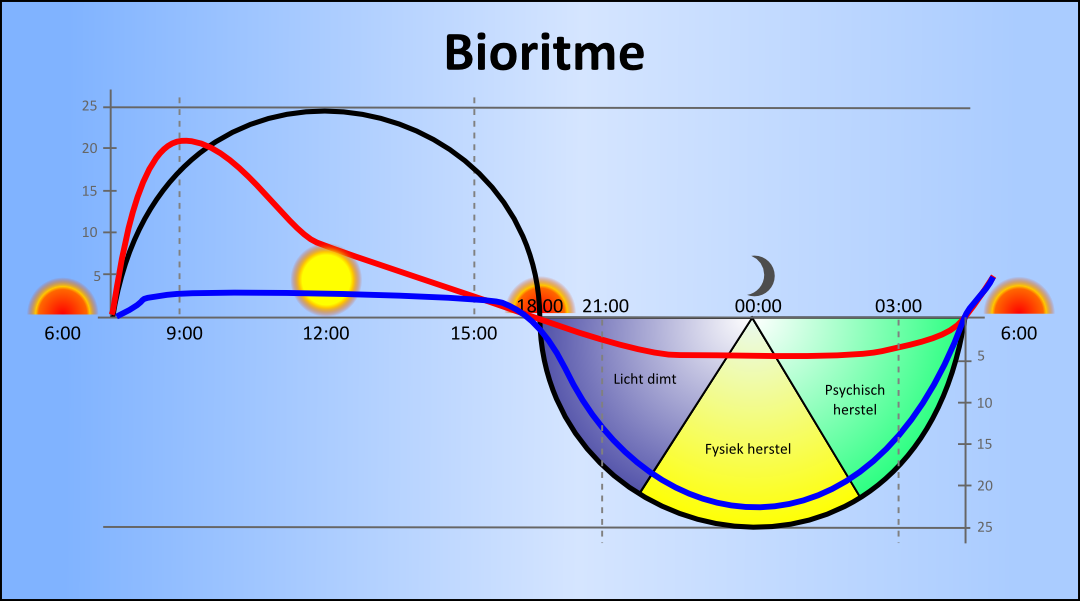In Tune with the Time: How Your Biorhythm Determines 80% of Your Sleep.
Your circadian rhythm , also known as your biological clock , is the determining factor that determines when you wake up, are active, relax, and ultimately drift off to blissful dreamland. This intricate dance of biological processes forms the foundation for a healthy, energetic lifestyle. So, let's delve into this phenomenon and discover how you can give your own circadian rhythm a powerful boost. Stay tuned, because we'll not only discuss the science but also offer practical tips to make your biorhythm shine like never before.
Pareto Principle
In the world of good sleep and the pursuit of optimal well-being, the circadian rhythm proves to be a true champion, according to the famous Pareto principle . It states that 20% of effort produces 80% of the results. Your biological clock , as the silent director of your daily rhythm, embodies this principle perfectly. While it's tempting to focus on diet, magnesium supplements, and other sleep-promoting remedies (which certainly have their value), research shows that the circadian rhythm itself is the true key to a good night's sleep and an energetic life. The effort you put into understanding and supporting this natural rhythm is that essential 20% that accounts for a whopping 80% of sleep success. So, while perks like diet and supplements are certainly nice, it's ultimately the biological clock that sets the tone and takes the lead in the quest for a better night's sleep.
What is the Biorhythm?
We hope we've piqued your interest in learning more about biorhythms . If not, please grit your teeth and read on. Biorhythms are like an internal clock that determines the rhythm of our daily lives. They regulate not only when we're awake and active, but also when we relax and fall asleep.
This biological clock is strongly influenced by external factors, especially light. Natural daylight plays a crucial role in synchronizing our internal clock with the natural day-night cycle. As soon as the sun sets, our bodies begin producing melatonin, a hormone that prepares us for rest and recovery. However, artificial light, screens, and irregular sleep patterns can disrupt this cycle.
Our biorhythms play a significant role in how deeply we sleep. They regulate not only when we fall asleep but also the quality of our sleep throughout the night. When this rhythm is properly aligned, we can enjoy more restorative and deep sleep, which is essential for our overall health and well-being. Remember, the length of your sleep doesn't necessarily indicate how well-rested your body is for a new day!
The biorhythm regulates the production of hormones like cortisol and melatonin. Cortisol helps us wake up in the morning, while melatonin helps us fall asleep and stay asleep. I don't think you want to disrupt the production of these crucial hormones, do you?

How do we ensure a well-functioning biorhythm?
As mentioned, light is the determining factor for our biorhythms . The most important thing is to synchronize your body with the sunrise and sunset. Think of it this way: In the past, people rose with the sun and went to sleep when it was dark.
Tips for a Healthy Biorhythm:
- Morning light : In the morning, it's crucial to get at least 10 minutes of direct sunlight in your eyes within the first 70 minutes of waking up (don't look directly at the sun). So, no sunglasses or contact lenses. On cloudy days, 20 minutes is sufficient. This signals to your body that it's morning, ensuring you wake up properly. Moreover, your circadian rhythm knows it's morning, so it also knows when evening will approximately arrive, which in turn ensures a better night's sleep.
- Daytime : During the day, it's important to soak up as much daylight as possible. Every bit of light is a signal for your biorhythm . For example, take a walk during your lunch break or open your window on your way home.
- Summer : In summer, the sun sets late, so it's important to sleep in a dark room and avoid blue light in your eyes during the last hour of the day. Blue light blocks melatonin production and increases cortisol (the stress hormone) production. Make sure you have good curtains or use a sleep mask. A sleep mask is the ideal solution, as it can also be used if your partner goes to bed later and still has the light on, or during an afternoon nap. Want to know more about power naps? Click here .
- Winter : In winter, the sun naturally sets earlier. That's why we want to eliminate blue light when the sun goes down. To achieve this, we use red light (Click here for the blog post about red light ) and blue light glasses . Blue light filter glasses are designed to reduce the blue light emitted by digital screens. Digital devices like smartphones, tablets, and computers emit blue light, which can affect our body clock and disrupt the production of melatonin, a sleep hormone. There's just one big "but" to these glasses... They need to be of good quality. Most glasses on the market are poor quality and barely filter anything. Want to know more about the quality of blue light glasses ? Check out this blog post .
What Else Can Boost Your Biological Clock?
We've already covered most of these topics extensively in other blogs, so here we'll just highlight what works. Want to know why it works? We encourage you to check out the relevant blogs.
- Consistent sleep times : Go to bed and wake up at roughly the same time every day.
- Cold therapy : Cold therapy in the morning and a warm shower in the evening. (Blog: Cold Therapy )
- Grounding : Grounding and sleeping grounded. (Blog: Grounding )
Curious about more sleep advice and personal tips? Sign up for our newsletter and receive a 10% discount on your first order. Let us guide you to a world of deep sleep and energy throughout the day!
Alina - Sleep advice for the hustle and bustle of everyday life!
